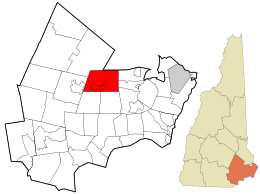Epping, New Hampshire
| Epping, New Hampshire | ||
|---|---|---|
|
||
| Nickname(s): Home of Three Governors "The Center of the Universe" |
||
 Location in Rockingham County and the state of New Hampshire. |
||
| Coordinates: 43°02′00″N 71°04′27″W / 43.03333°N 71.07417°WCoordinates: 43°02′00″N 71°04′27″W / 43.03333°N 71.07417°W | ||
| Country | United States | |
| State | New Hampshire | |
| County | Rockingham | |
| Incorporated | 1741 | |
| Government | ||
| • Board of Selectmen | Tom Gauthier, Chair Michael Yergeau Tom Dwyer Susan McGeough Bob Jordan |
|
| Area | ||
| • Total | 26.2 sq mi (67.9 km2) | |
| • Land | 26.0 sq mi (67.4 km2) | |
| • Water | 0.2 sq mi (0.5 km2) | |
| Elevation | 157 ft (48 m) | |
| Population (2010) | ||
| • Total | 6,411 | |
| • Density | 240/sq mi (94/km2) | |
| Time zone | EST (UTC-5) | |
| • Summer (DST) | EDT (UTC-4) | |
| ZIP code | 03042 | |
| Area code(s) | 603 | |
| FIPS code | 33-24660 | |
| GNIS feature ID | 0873591 | |
| Website | www |
|
Epping is a town in Rockingham County, New Hampshire, United States. The population was 6,411 at the 2010 census. Epping includes the area known as Camp Hedding.
The primary settlement in town, where 1,681 people resided at the 2010 census, is defined by the U.S. Census Bureau as the Epping census-designated place (CDP) and includes the densely populated portion of the town centered on New Hampshire Route 27 just west of New Hampshire Route 125.
The town was originally part of Exeter, one of the four original New Hampshire townships. To encourage settlement, as early as 1710 Exeter awarded free wood lots in the area. In 1741, Epping was granted a charter and incorporated as a town, the last New Hampshire town chartered by Governor Jonathan Belcher before the Province of New Hampshire was granted a governor who did not also govern the neighboring Province of Massachusetts Bay. Epping was named for Epping, in England.
Following the American Revolution, many residents of the town moved to Monmouth, Maine, when General Henry Dearborn offered free land to his soldiers. Through the 1800s, farming was a principal occupation in Epping. The town also had substantial reserves of clay, long used by local residents to make bricks, and in 1840, the first commercial brickyard was established in Epping.
It was formerly said in jest: "Epping -- the center of the universe." Now, due to its strategic position at the crossroads of Route 101 and Route 125, the community is indeed becoming a retail center, as chain stores locate here. But because the traditional town center is clustered around Route 27, an older road connecting Exeter with Hooksett and Manchester, Epping's antique architectural charm has been spared from redevelopment.
...
Wikipedia

